Forever 21 Supplier
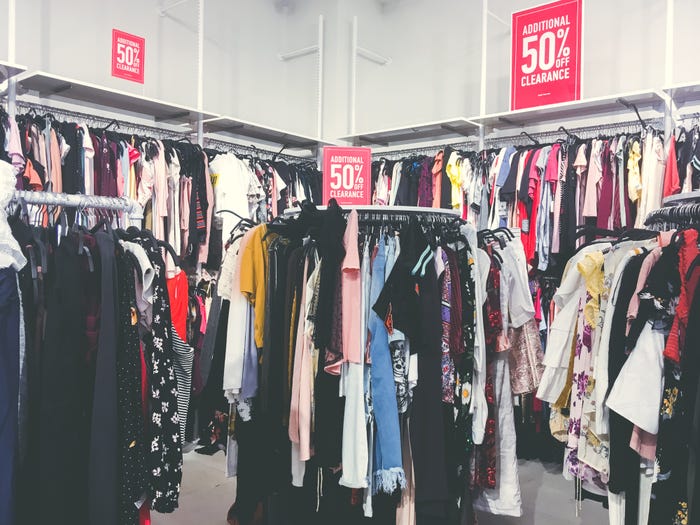
Forever 21 Supplier
Retail giant who took over malls with its cheap clothes inventory is currently in Chapter 11. Plans include closing stores, expanding online platform and making other adjustments.
Winnie Park, appointed CEO in January, faces an enormous task at Forever 21: reimagining it for Gen Z audiences, potentially through partnerships with influencers and exploring circular initiatives.
Quality
As a company, Forever 21 places great emphasis on maintaining high standards of quality control. They work closely with their suppliers and manufacturers in China to implement stringent quality measures during production processes to guarantee safe products made under ethical practices that adhere to Forever 21’s high ethical standards.
Forever 21 has also adopted the “fast fashion” model, producing and delivering clothing quickly based on runway trends. This strategy has allowed Forever 21 to rapidly grow into one of the world’s leading fashion retail companies; however, its implementation comes with drawbacks such as poor product quality.
Many customers of Forever 21’s products, particularly those shipped from China, express concerns over quality. To address these worries, Forever 21 has implemented stringent sourcing policies designed to alleviate customers’ worries: Forever 21 works closely with its suppliers to ensure employees are treated fairly with adequate wages and benefits, as well as ensure all vendors adhere to Forever 21’s standards regarding slavery and human trafficking.
Forever 21’s supply chain is complex and involves numerous suppliers. To optimize its operations and decrease shipping costs while increasing customer satisfaction, Forever 21 uses an effective logistics network that connects its various sourcing locations with their distribution centers and ultimately their customers worldwide. This approach helps Forever 21 reduce shipping costs while simultaneously improving customer satisfaction.
Forever 21 has seen significant cost reduction from working with local sourcing partners. Their relationship with Fashinza in India, which allows them to produce niche apparels not readily available elsewhere in the country. Furthermore, Fashinza helped Forever 21 establish a robust supply chain system for their new summer collection.
Forever 21 has successfully utilized social media and influencer marketing strategies to connect with their target audience and drive sales. Their collaborations with popular influencers and celebrities have increased brand recognition while creating excitement among followers. Furthermore, Forever 21’s e-commerce platform has enabled it to reach an international market.
Service
Forever 21 is a chain of fashion stores catering to young women and girls. Offering trending styles at low costs with new arrivals daily, Forever 21 puts customer satisfaction first and allows customers to return items for exchange or refunds.
Forever21 is a privately owned company with over 500 stores globally, including warehouses, offices and showrooms. Registered as an official entity with the appropriate physical infrastructure required (storefront, offices, production centres etc), Forever21 ensures it can fulfill orders unlike some fraudulent online shops that lack such amenities.
While Forever 21 provides fashionable basics and trends, their focus lies more strongly on offering distinctive style designs that stand out from the market. Their goal is to foster individuality and confidence within every shopper by offering high quality designs at great values within exciting store environments.
Forever 21 has long been at the center of various fashion industry controversies; this isn’t uncommon and hasn’t stopped the chain from expanding and growing their business despite this criticism. They currently boast global reach offering clothing and accessories for men, women and kids.
Even amid criticisms against Forever 21, Forever 21 remains committed to meeting its ethical obligations. They have taken numerous steps to improve their business practices, such as banning rabbit hair altogether and working with PETA to prevent cruelty to animals. They have also banned mohair due to allegations that goat farmers who provide this fiber do not treat their goats humanely.
Forever 21 takes pride in producing products of superior quality while at the same time making sure its employees are treated fairly. The company implements stringent health and safety standards at its factories as well as social responsibility programs to guarantee fair pay to employees.
Flexibility
Forever 21 has long been beloved for its fashionable clothing at low prices. Established by the Chang family, Forever 21 expanded from seven stores to hundreds around the globe with annual sales exceeding $4 billion at its height. However, after filing for bankruptcy protection and plans to close stores worldwide due to insular management style issues from founders Chang family – including disastrous real estate transactions and missteps related to merchandise merchandising. Former employees and industry experts point out this is now all but certain failure.
Like most large retailers, Forever 21 is often subject to copyright infringement lawsuits from designers who claim that its fashion designs resemble those they created and violate trademark laws. Although Forever 21 was able to settle these suits successfully, no changes have been implemented within their production processes that would enable more original fashions.
Forever 21’s supply chain includes numerous factories and suppliers from around the globe. Each supplier must agree to and abide by Forever 21’s social responsibility standards and vendor audit program, while working in an environment conducive to worker health and legal rights protection. Furthermore, Forever 21 requires all factories supplying it goods to comply with wage-hour laws as well as guarantee that any materials included into its products are free from slavery, forced labor and human trafficking.
Forever 21’s flexibility can also be seen in its bulk buying approach and supplier relationships to produce quality garments quickly. Furthermore, Forever 21 has multiple manufacturing and fulfillment centers to meet customers’ demands quickly.
One reason behind Forever 21’s recent financial struggles is owed millions by suppliers who are waiting to be paid. Under bankruptcy law, these creditors may receive at least some portion of what is owed them from sales proceeds from Forever 21.
Value
Forever 21 rapidly rose to become one of the largest and most competitive fast fashion retail brands by offering low price points, large merchandise selections in prime locations, and rapid global logistics. They were able to directly compete against iconic fashion brands such as ZARA, Hennes & Mauritz (H&M), and Uniqlo; however as they expanded operations worldwide into over 800 globally operated stores they eventually lost sight of what made Forever 21 unique: rapid changes to product offerings according to what was fashionable.
The Changs are born-again Christians who try to run their company according to Christian principles and values. Before making major decisions, they pray and trust in God’s guidance on their path. Additionally, they dedicate millions of dollars annually to charity organizations worldwide.
Even with its strong values, Forever 21 was struggling financially and recently filed for Chapter 11 bankruptcy protection. Plans include shutting down up to 350 directly operated global points of sales – including 178 in the US – while rejecting lease agreements signed over 10 years ago that are no longer profitable markets – many are located within malls which may benefit from Forever 21 leaving.
If Forever 21 can continue operating as a smaller retailer focused on the United States, their cost structure would become far more cost-efficient, leading to improved bottom line profits and negotiations with landlords to secure more favorable terms for them. They might even consider offering them shares of the business in exchange for staying open longer.
Forever 21 relies on its network of suppliers to assist them in producing the products sold in its stores and online. These suppliers offer services such as cutting, sewing, embroidery and inventory management – as well as additional value by aiding with shipping arrangements and inventory control.
Fashinza is an end-to-end garment production supplier for Forever 21 that specializes in end-to-end garment production. Last winter, Manvi from Forever 21 praised Fashinza’s performance, saying they managed the entire process well and saved him both time and effort in managing it himself. Furthermore, Manvi noted how Fashinza’s dashboard provides real-time updates of orders which sets it apart in the market.
Step-by-step training on how to sell to retail chains!
We explain exactly how to do that and how to get started today. I’ve taught over 100,000 of companies over the years across the globe on how to get your products to the stores. And so we’re here to support you. Or please subscribe to our Youtube channel and or be on the lookout for additional training that we create.
We are here to expedite the process of generating revenue with your physical products and that’s what we’re all about. Take a look at our advanced training, live events, certification programs and so much more.
In this training, I will discuss some of the things to think about when approaching a retailer to sell your products and become a vendor. Hope it helps! 🙂
Karen Waksman,
Retail MBA
Questions? Contact Us!
1-855-Retail-2 (Call or Text)
Email: info@retailmba.com
Retail MBA provides a step-by-step formula on How to Sell to Major Retailers, Online Retailers, Smaller Retailers, Catalogs and More. No Experience Required! These solutions continue to convert for clients year-over-year! These are Time-Tested and Proven Strategies that we utilize ourselves when going after stores! Everything we teach, we test. Want access to these formulas? ANY one of our programs and coaching systems gives you access to them now. With that said…
Here are 5 Easy Ways to Work with Us:
1) Free Training – If You Would Like to Join Our Next FREE Webinar Training Called “Retail Chain Store Secrets – How to Sell to Major Retail Chains. No Experience Required” Then Sign Up NOW To Learn All About Selling into Retail Chains By Clicking Here!
2) Retail MBA Year Long Coaching and Training System – Our Year Long Coaching and Training System with Karen Waksman is POWERFUL! This is our most popular training and coaching system! We walk you through how to approach, pitch and sell to retail chains and we coach you along the way! Join us by Clicking Here!
3) Masterclass Intensives – Want to Join our Next 4 Week Elite Retail MBA Masterclass Intensive? These Intensives Are EPIC for people who Love Fast Paced Learning – Homework, Retail Coaching, Developing Your Strategy, Buyers Contacts and More! These Events Are Held Every Quarter. Join us by Clicking Here!
4) Done-for-You Program – If You Want Karen Waksman and Her Team to Reach Out to Your Top Dream Retail Chains On Your Behalf – And You Have a Retail-Ready Product, Check Out our Epic Done-For-You Service by Clicking Here!
5) In Person Events – If You Want to Learn LIVE and Meet Karen Waksman in Person at Our Next “America’s Next Retail Product: LIVE Event with Other Like-Minded Individuals in Beautiful San Diego, CA! We Would LOVE to Have You Join Us by Clicking Here!

Check Out Our Additional Blog Posts Here:
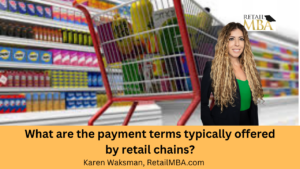
Retail Terms
Retail Terms – What are the payment terms typically offered by retail chains? Click Here to Learn More!
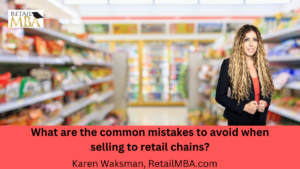
Retail Vendor
Retail Vendor – What are the common mistakes to avoid when selling to retail chains? Click Here to Learn More!
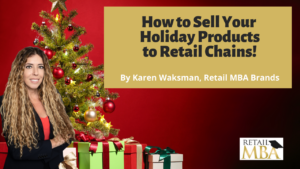
How to Sell Your Holiday Products to Retail Chains
New Training on How to Sell Your Holiday Products to Retail Chains

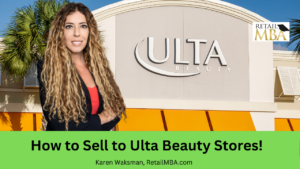
Ulta Beauty Vendor
Ulta Beauty Vendor – How to Sell to Ulta Beauty Stores. Click Here to Learn More!
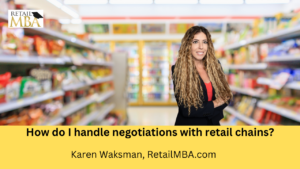
Retail Strategy
Retail Strategy – How do I handle negotiations with retail chains? Click Here to Learn More!

